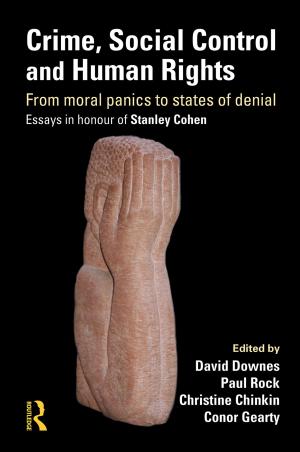Transforming Hate to Love
An Outcome Study of the Peper Harow Treatment Process for Adolescents
Nonfiction, Health & Well Being, Psychology, Psychotherapy, Mental Health| Author: | Melvyn Rose | ISBN: | 9781134773602 |
| Publisher: | Taylor and Francis | Publication: | September 2, 2003 |
| Imprint: | Routledge | Language: | English |
| Author: | Melvyn Rose |
| ISBN: | 9781134773602 |
| Publisher: | Taylor and Francis |
| Publication: | September 2, 2003 |
| Imprint: | Routledge |
| Language: | English |
The Peper Harow residential community was founded in 1970 and gained international repute for its pioneering work with disturbed adolescents. For over 20 years, this remarkable establishment provided a therapeutic environment for teenagers who had often suffered appalling abuse, and yet for whom the state's only remedial provision until then had been in the punitive form of the approved schools.
In Transforming Hate to Love Melvyn Rose, the community's founder, assesses Peper Harow's success in managing disturbed behaviour, and offers views on areas where the establishment could have responded more effectively to the needs of its residents. His study is complemented by the testimony of ex-residents helped by Peper Harow to overcome their fears and abandon their disruptive behaviour.
The overwhelmingly positive outcome indicates the need for a review of current social policy towards deviant youth and shows how society as a whole would benefit from a psychodynamic view of the causes of criminality and mental ill-health among the young.
The Peper Harow residential community was founded in 1970 and gained international repute for its pioneering work with disturbed adolescents. For over 20 years, this remarkable establishment provided a therapeutic environment for teenagers who had often suffered appalling abuse, and yet for whom the state's only remedial provision until then had been in the punitive form of the approved schools.
In Transforming Hate to Love Melvyn Rose, the community's founder, assesses Peper Harow's success in managing disturbed behaviour, and offers views on areas where the establishment could have responded more effectively to the needs of its residents. His study is complemented by the testimony of ex-residents helped by Peper Harow to overcome their fears and abandon their disruptive behaviour.
The overwhelmingly positive outcome indicates the need for a review of current social policy towards deviant youth and shows how society as a whole would benefit from a psychodynamic view of the causes of criminality and mental ill-health among the young.















